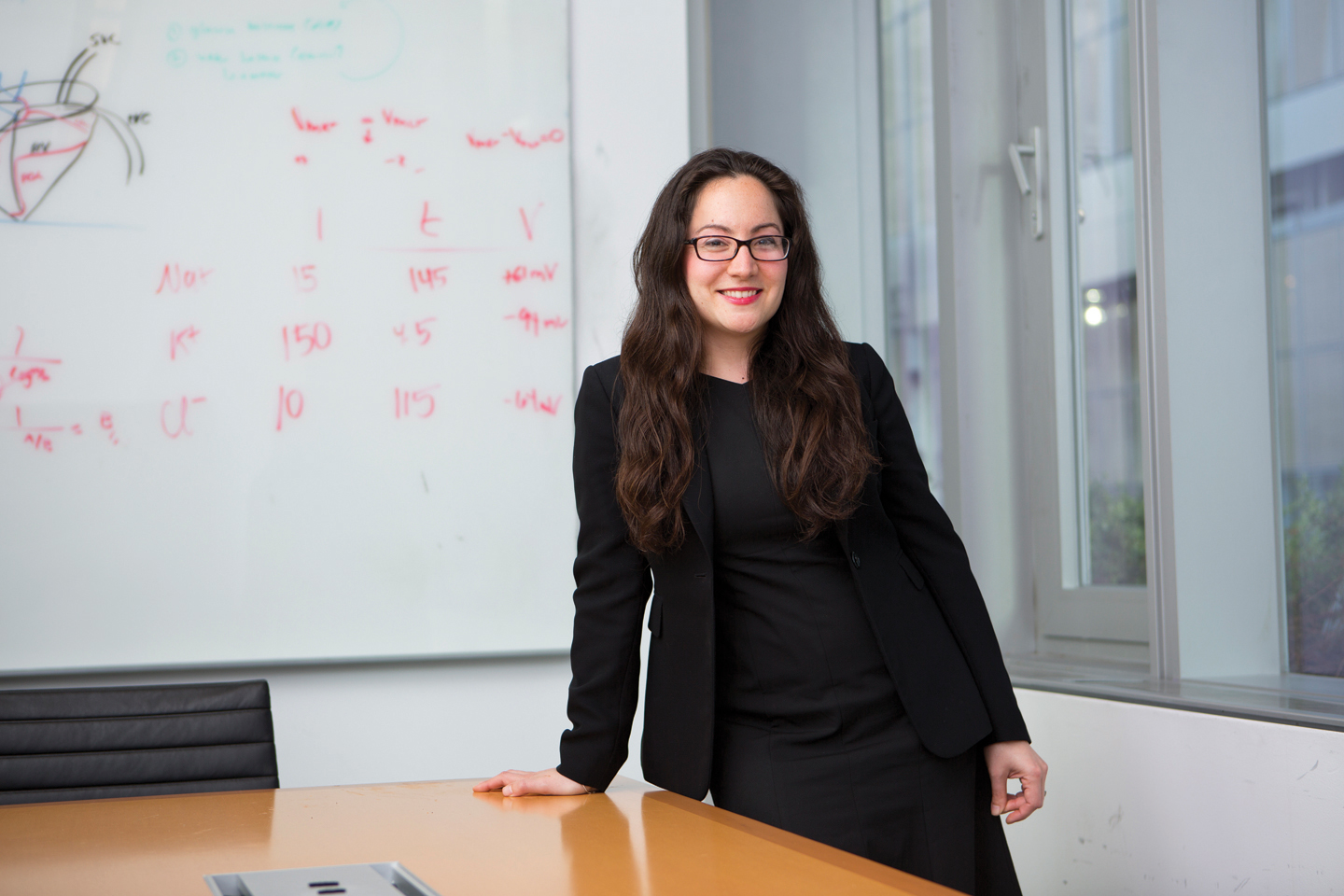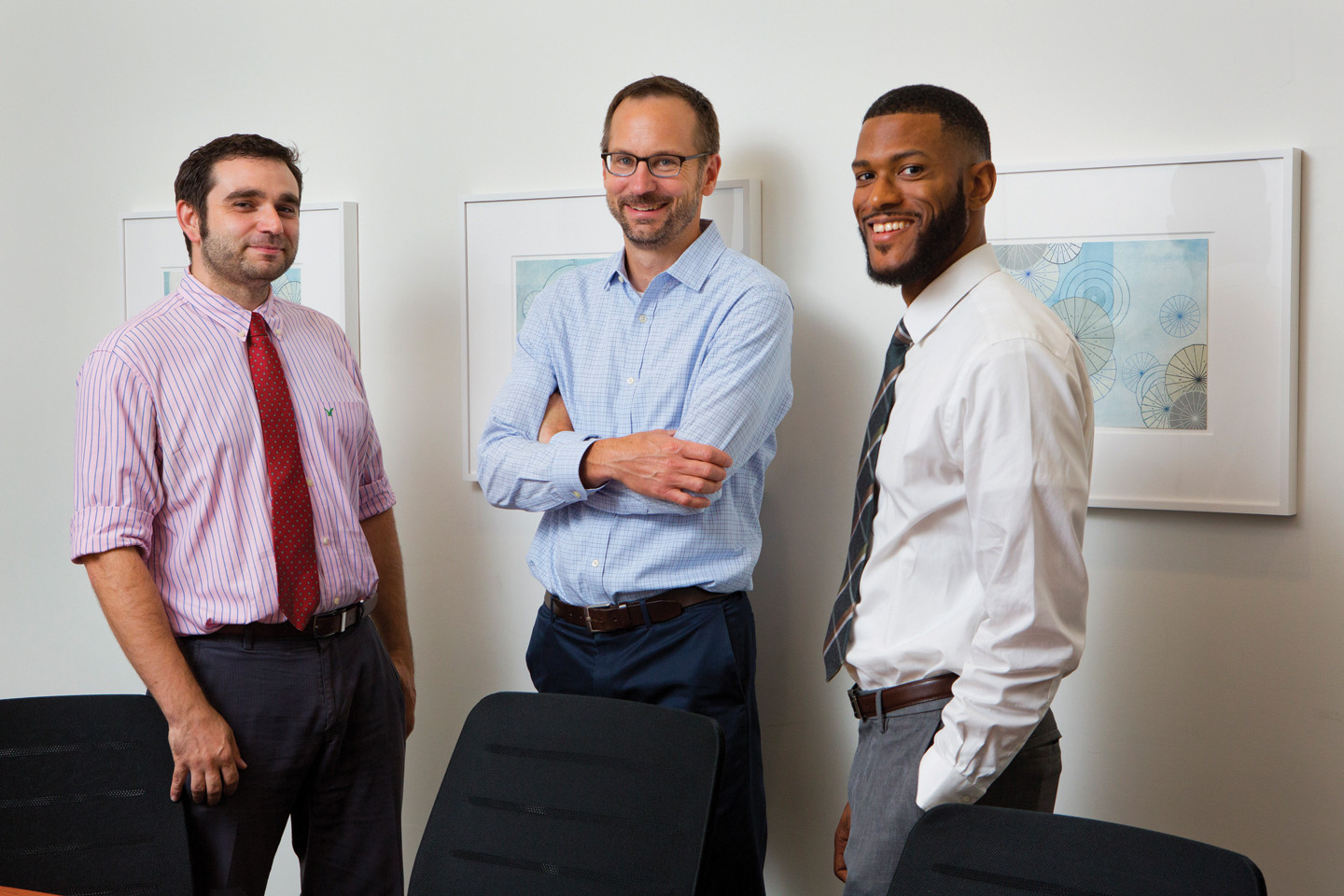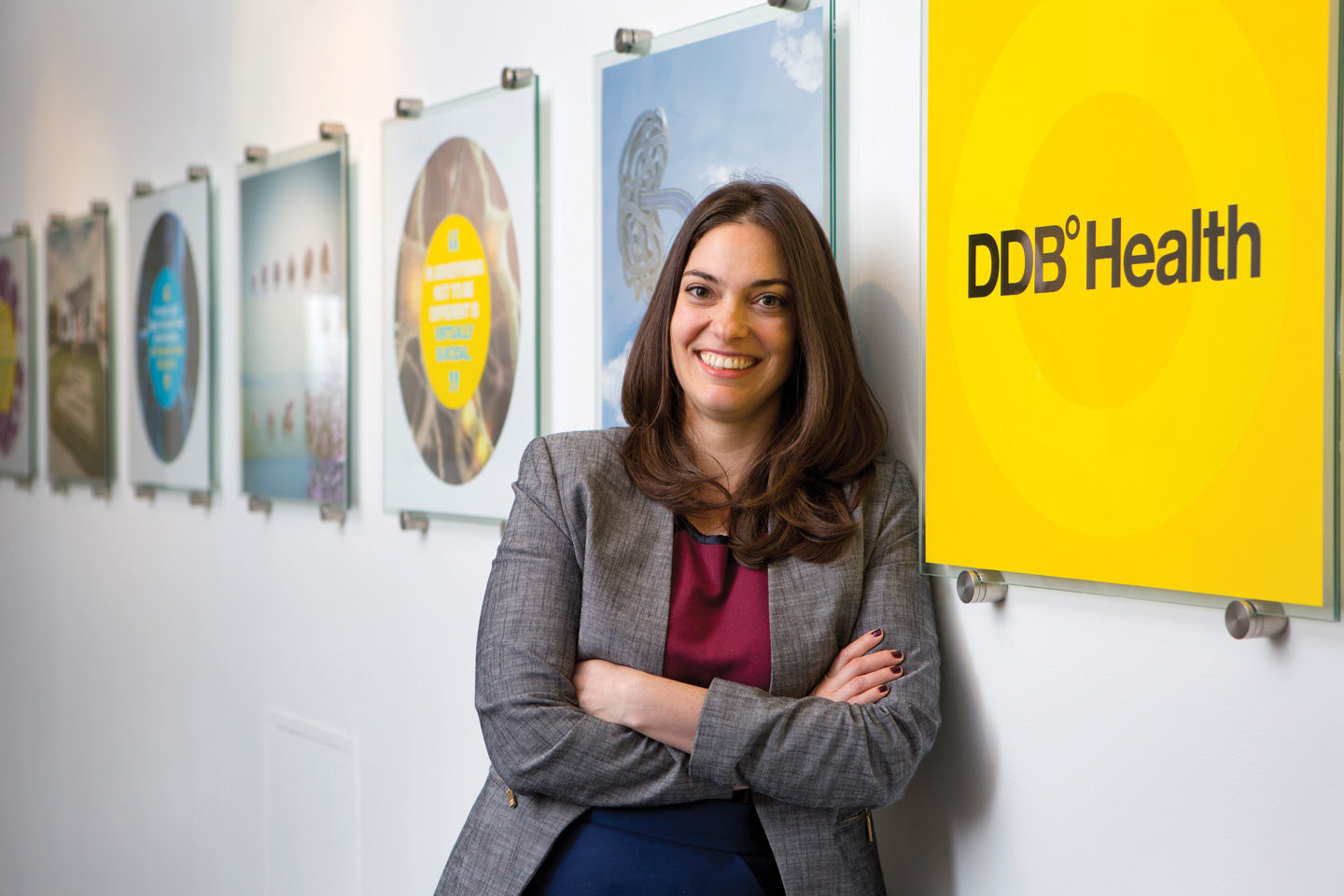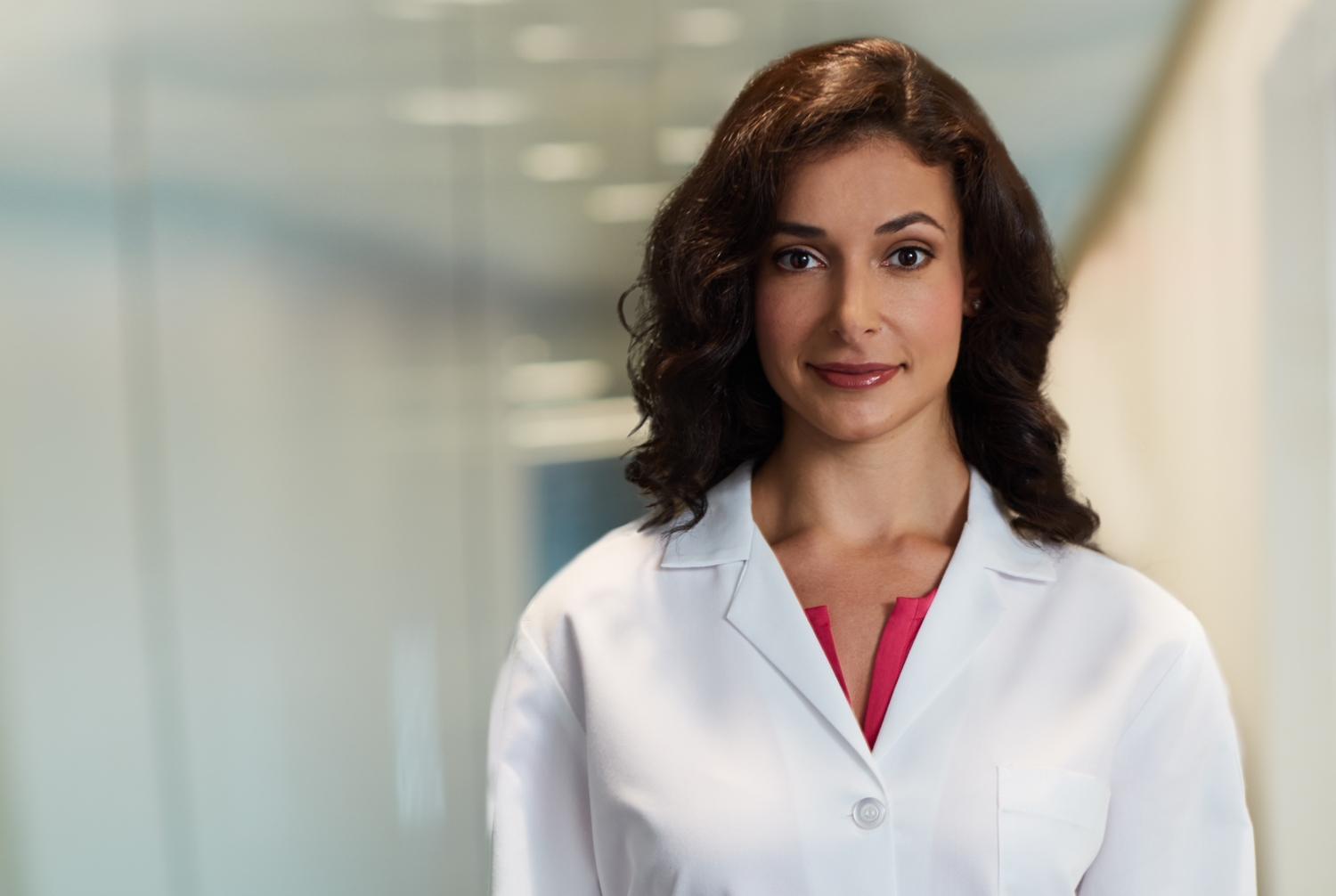More doctoral alums — like Natalya Gertsik, Ph.D. ’16 — are pursuing fields beyond the bench. And the Weill Cornell Graduate School of Medical Sciences is helping them get there. Photo credit: Travis Curry
By Heather Salerno
Photos by John Abbott
One day shortly after Natalya Gertsik, Ph.D. ’16, began her doctoral work in biochemistry at the Weill Cornell Graduate School of Medical Sciences, she and her classmates sat down with a professor to talk about their career goals. But Dr. Gertsik kept mostly quiet after listening to the others speak about their future plans — because unlike them, she didn’t want to pursue a faculty or research position at an academic institution, the typical ambition for someone with a doctorate. “This was six years ago, but I still remember it. Every single person said they wanted to be a postdoc or a professor,” says Dr. Gertsik. “I think that job would be an amazing one to have, but to get there, you need to do many, many years of research where you’re sitting at the bench.” She saw herself using her Ph.D. in a different way.
The graduate school’s fundamental mission is to rigorously train the next generation of top biomedical scientists whose research can advance scientific knowledge and patient care. And though many of her peers stayed on the academic track, Dr. Gertsik wasn’t alone in her desire to look at other professional possibilities — and the graduate school is increasingly addressing the need to prepare students like her who want to pursue jobs outside academia. In recent years, it has introduced classes on entrepreneurship, enabled internships so those interested in careers outside academia can gain such experience and actively recruited guest speakers to discuss a variety of career options. And perhaps just as importantly, Dr. Gertsik says, administrators and instructors are increasingly offering more open support and encouragement to anyone considering an alternate path. “That has definitely changed from the time I started to the time I graduated,” adds Dr. Gertsik, who now works as an associate for the global management consulting firm McKinsey & Co., focused on the growth of biomedical companies. “I feel like I lived through a bit of a transformation.”

Dr. Sarah Kishinevsky, director of the new Dean’s Entrepreneurship Lab in the graduate school
There are several reasons behind this shift. While in the last five years an estimated half of the graduate school’s alumni have pursued jobs at a university or other educational setting, according to its alumni relations office, competition for academic jobs has become stiffer than ever. The opportunities for postdoctoral and faculty positions in the biomedical sciences have become more competitive in the last two decades, partly because of decreased funding from the National Institutes of Health. According to a 2014 report by the National Science Foundation, the number of people getting Ph.D.’s in biomedicine rose from about 105,000 to nearly 180,000 between 1993 and 2010, yet those obtaining employment in academia during that period dropped from 58 to 51 percent.
As those opportunities have shifted, student interest in non-academic fields — ranging from data science to biotech to consulting — has grown. The NSF report found that while the percentage employed in academia decreased, the number of biomedical doctorate holders employed in the private sector rose by 8 percent.
Other factors make an academic career more challenging than in the past. Most graduating Ph.D.’s interested in staying in academia must spend two to five years doing postdoctoral research, meaning biomedical scientists are typically in their 30s before they land a tenure-track position.
“I think of academics as a calling,” says Dr. Gary Koretzky, dean of the Weill Cornell Graduate School of Medical Sciences. “We are training the next generation of scientists who are going to lead academic medical centers, but we realize not everybody will. We’re much broader in our thinking out of respect for the qualities and talents of our students — and also out of the recognition that there are many more things you can now do with a Ph.D. in biomedical sciences.” Adds Interim Dean Dr. Augustine M.K. Choi: “With a Ph.D. you can do practically everything. You can do research, you can become a policy maker, you can do entrepreneurship, you can get an MBA — there are no limitations.”
Doctoral candidates are taking notice. In a study from Cornell University and Georgia Tech published in Science in May, more than a third of nearly 6,000 Ph.D. students surveyed at 39 U.S. research universities said they had more interest in careers outside academic research. At Weill Cornell Medicine, an estimated half of the graduating Ph.D. students have opted for non-academic jobs, such as in healthcare, medical consulting and at pharmaceutical companies. And the graduate school’s location in New York City provides a natural and rich resource of professional exposure and networking opportunities for students to capitalize on as they nurture their ambitions. “By improving what we’re offering and how we are educating our students about careers outside academia during their Ph.D. years, the hope is to get them going from their Ph.D. directly into the career of their choice at a much earlier stage after graduation,” says Matt Cipriano, manager of enrollment and education operations.

The graduate school’s Matt Cipriano and Drs. David Christini and W. Marcus Lambert
To that end, the graduate school now offers electives that go beyond basic science, such as “Bench to Bedside: Business Fundamentals for Entrepreneurial Scientists,” a 12-week seminar series that invites professionals from all backgrounds to lecture and advise participants at all stages of study. During the course, those enrolled form two- to three-person cross-disciplinary teams and write business plans based on biomedical technologies approved by the licensing offices of the Tri-Institutional entities (Weill Cornell Medicine, Memorial Sloan Kettering Cancer Center and The Rockefeller University). “It’s a life sciences entrepreneurship crash course,” says Dr. Sarah Kishinevsky, Ph.D. ’16, who started Bench to Bedside as a student club in 2011. The club became so popular that Dr. Kishinevsky helped the school turn it into a formal class two years ago. Her work with the initiative altered her career trajectory, too, leading to Dr. Kishinevsky’s own non-traditional position in academia as director of the Dean’s Entrepreneurship Lab, a new program at Weill Cornell Medicine. “The lab is directed toward helping foster and grow a biomedical entrepreneurial ecosystem,” says Dr. Kishinevsky. “The class was one indicator that students were very interested in this.”
Bench to Bedside now draws up to 150 students each semester, culminating with a “pitch day” event during which each team presents its business plan to a group of venture capitalists. So far, four projects have received funding from investors since 2011, including Immunovent, an allergy diagnostics venture co-founded by Dr. Kate Rochlin, Ph.D. ’14. The company is developing a needle-free test that can more accurately pinpoint airborne and food allergies using a small sample of cells collected from the inside of the nose or mouth, rather than through blood or skin testing; the test was invented by Dr. William Reisacher, an associate professor of otolaryngology at Weill Cornell Medicine who specializes in allergies and serves as Immunovent’s medical advisor. “It’s much less invasive, so it’s great for kids and the elderly,” says Dr. Rochlin. “You can also test for multiple allergies from a single swab.”
Throughout graduate school, Dr. Rochlin kept an open mind about possible careers. Yet before Bench to Bedside, she had no idea how to go about starting her own enterprise. “The class gives you such an exciting new way to look at science. It’s a breath of fresh air,” says Dr. Rochlin. “This lets you pick your head up and look around to see that there are all these different ways science can be used. It’s really liberating and empowering.”
Even if a project doesn’t mature into a company, graduates like Dr. Bill Mills, Ph.D. ’15, say the course provides important lessons. His team’s plan for a molecular diagnostic test for kidney transplant patients showed promise as a start-up at first, but the endeavor didn’t end up moving forward. Still, he has no regrets. “I learned a lot,” says Dr. Mills, who decided to get an MBA from the Ithaca campus after earning his doctorate in pharmacology and now works as an analyst at Camber Capital Management, a Boston-based hedge fund that invests exclusively in healthcare. “The Bench to Bedside class was by far one of the most valuable things I did during my Ph.D. program. There are tons of amazing things going on in science, but you get so insulated in the lab.”
For Dr. Tracey Van Kempen, Ph.D. ’14, the decision to pursue a non-traditional path was partly spurred by the financial crisis of 2008, which happened at nearly the same time as when she began her doctoral program. Prior to that, she worked as a research assistant for three years at Williams College—her undergraduate alma mater—and loved it. “I thought, ‘This is exactly what I want to do,’” she says. But after the economy plunged, and encouraged by peers who’d taken jobs in medical education, she landed a post at a medical advertising firm after receiving her degree. Now she’s the associate medical director of DDB Health, a New York-based network of healthcare communications companies, where she helps create marketing strategies for pharmaceutical companies and other clients. “Research is always moving forward, never doing the same thing day to day, but it’s such a slow process,” says Dr. Van Kempen, whose degree is in neuroscience. “I really enjoy doing things with tighter deadlines and shorter projects, and I was drawn to the opportunity to learn a ton of new and different things about health and science. That’s what clinched it for me.”

Dr. Tracey Van Kempen, associate medical director of a network of healthcare communications companies
At Weill Cornell Medicine, external internships are now part of some students’ graduate-level training, enabling them to obtain outside work experience while still in school. Internships had generally been discouraged in the past, in part because they took time away from a student’s primary training in the laboratory, says Dr. W. Marcus Lambert, director of diversity and student services. But now, he says, the value that some external internships bring to a student’s overall training and dissertation work is clear, and the graduate school allows them on a case-by-case basis as long as the internship is in line with the student’s thesis research.
For Han Yuan, a fourth-year Ph.D. student in computational biology and medicine, that change was a blessing. This past summer, he interned for three months at the IBM Watson Research Center in Yorktown Heights, New York, where he was assigned to projects related to cancer genomics, which may help oncologists develop more personalized patient care. Yuan says he may stay in academia, but working at IBM short-term has helped him envision other possibilities. “As an undergrad, I didn’t have a chance to do an internship, so to be able to do this during grad school gives me more information to make a better decision,” he says. Either way, Yuan says, the internship has helped him polish his interviewing and interpersonal skills. “I got to meet with people in different areas. Some were working on software, some on hardware,” he says. “It was a broader range — not everyone was in research. I think that’s also good.”
The school’s Three-Minute Thesis contest is another new way students can ready themselves for all kinds of workplaces. First held last fall, the competition challenges Ph.D. candidates to explain their research in 180 seconds — and in a way that any non-specialist can understand. No animations, electronic media or props are allowed, and they’re permitted only a single PowerPoint slide to assist with their presentation. This teaches a “real world” style of effective communication that emphasizes broad strokes over technical details, says Dr. David Christini, associate dean for programmatic development at the Weill Cornell Graduate School of Medical Sciences. “You have to get to your point quickly, clearly and impactfully,” he says. “If you’re in the scientific business world or the startup world, you need to be able to convince people fast. This is geared for that.”
And when it comes to career guidance, Cipriano says that the school has recently ramped up efforts to bring in more speakers to provide first-hand knowledge of different industries. A series called Alumni Career Talks launched in June 2016, with as many as a dozen events anticipated for each academic year going forward. The series is organized by Sharon Meiri Fox, alumni director for the graduate school; its inaugural session featured Dr. Cristina Ghenoiu, Ph.D. ’12, a biotech equity research associate at investment banking firm Cowen and Company — and though mostly fifth-years and up were expected, a more diverse crowd wound up attending.
Weill Cornell Medicine has committed, too, to funding more career outreach activities organized by student groups, such as networking events. And it’s working to produce a single calendar that lists job-related programs and events, so aspiring Ph.D.’s aren’t seeing the school’s offerings piecemeal. “There are more opportunities than ever before,” says Dr. Gertsik. “I’m almost a little jealous of people starting grad school now.”
For Dr. Christini, these efforts combine to create a powerful recruiting tool that will hopefully entice the best and brightest to the graduate school. Regardless of which paths students ultimately choose to leverage their biomedical science training, he says having a diversity of interests on campus benefits everyone. “It energizes the student body,” he says. “Whatever you can do to make sure students are happy and excited is contagious.”
This story first appeared in Weill Cornell Medicine, Vol. 15, No. 4.

